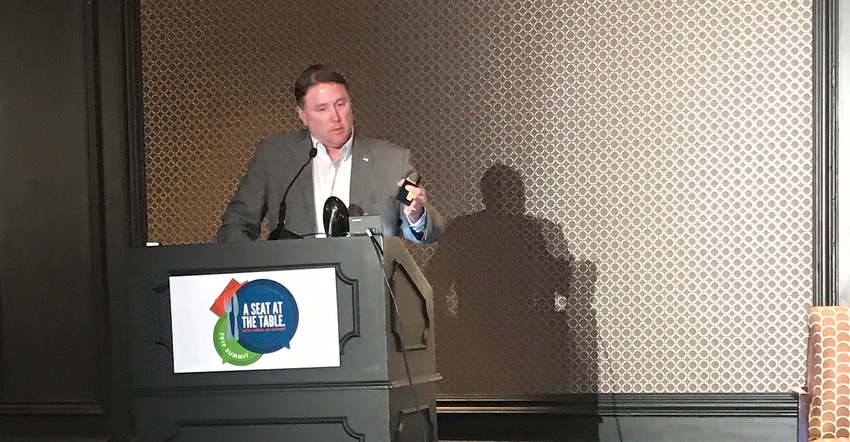10 takeaways from the Animal Ag Alliance Stakeholders Summit
Food is an emotional topic for consumers. They have their beliefs and the truth rarely changes their mind. Therefore, we need to listen, acknowledge concerns and find new ways to have conversations with consumers.
May 13, 2019

The 2019 Animal Ag Alliance Stakeholders Summit, held last week in Kansas City, was about engaging each other under the theme of “A Seat at the Table,” to hear from and be heard between key stakeholders in restaurant, retail and foodservice companies, farms and ranches, government agencies, agribusinesses, and agriculture and food associations.
As expected, the Summit was outstanding. Here are my top 10 takeaways from the conference.
Consumer focus panel: There is no question consumers want to know more about where their food comes from. The panel suggested information be available at the retail level. Consumers want to support farmers but want to hear and see the “story” about their food. Videos are powerful. They also want meat label information available to them at the meat counter.
Anti-animal activist organizations: Humane Society of the United States is using a new approach to further their anti-livestock cause. They are focusing on working through churches. Their goal? To create guilty feelings when eating meat. They use biblical scriptures to support their goals. But the take-home is some of these “biblical scriptures” don’t exist.
Food purchases: Only two of the six panelists drink dairy milk. The rest either drink almond milk or no milk due to lactose intolerance. Animal welfare played no part in their decision to consume dairy milk. When asked about egg purchases, five out of six were buying the most economical value. Size of the farm did matter to the consumer panel. They prefer and trust small farms, but could not define what a large or corporate farm is. They just know they don’t trust them. The key for them is trusting farmers who provide direct care.
Dietitian’s perspective: Leah McGrath and Kim Kirchherr, both registered dietitians, talked about the consumer’s food perspective. One of the most important takeaways was the “noise” we hear through social media does not reflect reality. For example:
77% of consumers do not currently seek non-GMO.
59% are not trying to minimize purchase of non-GMOs.
0.5% of U.S. consumers are vegan. 2 to 3.3% are vegetarians. 84% of vegans and vegetarians will return to eating meat.
For those who monitor social media, these facts don’t reflect what is perceived. Even through all the social media mud, consumers still make food purchase decisions about price, safety and taste.
New anti-agriculture “movements” by Andy Curliss, North Carolina Pork Council CEO: These lawsuits are very strategic. They bring in out-of-state lawyers, don’t allow certain experts to testify, and don’t allow jurors to visit farm sites. They portray hog farms as the “monster.” Because of these contributing factors, large monetary sums have been awarded to the plaintiffs. The facts surrounding these nuisance lawsuits should have everyone concerned.
Food service perspective: Consumers are generally wanting to eat less meat. Many consumers don’t trust science and yet are concerned about the carbon footprint. The challenge is how do we continue to decrease carbon footprint using science that consumers don’t trust.
There were a couple of points made that I do not agree with. When asked about food company specific time guidelines such as cage-free chickens and stall-free pork, they told the attendees that producers agreed to the new guidelines. I disagree the pork industry agreed to a timeframe for stall-free housing since they support multiple housing methods. They also felt certifications and audits were a positive step to bridge the producer, food service relationships and trust with consumers.
New technology: Consumers are skeptical of new technology, such as gene editing being used in their food. This will continue to be challenging for agriculture.
Alternative proteins: The new alternative proteins are much better tasting than previously. There is a lot of investor interest in alternative proteins and they have a good marketing strategy. As acknowledged with the food service panel, people are trying to reduce meat consumption and alternative proteins are a viable substitute.
How does agriculture work with the new alternative proteins? First, we need to stay on top of the new products, we need to rethink the meat case products and take a lead on health and sustainability.
Animal activists: Their objective is to escalate the confrontation. It’s recommended that farmers build a good relationship with law enforcement and also make it difficult for activists to come into their facilities.
Feedback from conference: This is truly one of the best animal ag conferences to attend. The networking is phenomenal, the speakers are top notch, and it’s one way producers and other stakeholders can stay up-to-date on current issues or trends in the agriculture field.
Going forward, what lessons can be learned?
It still is about communication and developing relationships. We have to find a way to tell our story to consumers in a way that is easily available for them to access. We need to be able to look past the “loud voices” and know the truths about consumer beliefs and their food. Yes, consumers need food choices. Everyone agrees with that, but we also need to make sure we have an informed consumer, which is an enormous challenge.
Food is an emotional topic for consumers. They have their beliefs and the truth rarely changes their mind. Therefore, we need to listen, acknowledge concerns and find new ways to have conversations with consumers.
Wanda Patsche is active on social media with her “Minnesota Farm Living” blog. You can also find her on Facebook or follow her on Twitter @MNFarmLiving. Patsche won a “A Seat at the Table” online farmer photo contest earning her free registration to the Animal Agriculture Alliance’s 2019 Stakeholders Summit, $300 travel stipend and a two-night stay at the hotel in Kansas City. She won the contest with a photo of a Compart’s pork chop she ate at Manny’s Steakhouse in Minneapolis.
Source: Wanda Patsche, who is solely responsible for the information provided, and wholly owns the information. Informa Business Media and all its subsidiaries are not responsible for any of the content contained in this information asset.
About the Author(s)
You May Also Like





